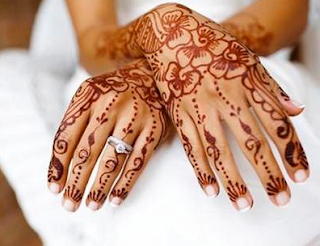 |
| Source: some random website |
Another friend is not Hindu, but honors the god, Ganesha, which is the god you pray to to remove obstacles. The figure is interesting. It is primarily an elephant, but with multiple limbs as well as other adornment. I can't speak much about it at this point because I don't know the full history behind it. I didn't quite get why she was so fond of this god, but I think I'm starting to. It fulfills a need for her and gives her comfort and a sense of control in her life.
The Catholic faith taught us not to honor false gods, and I imagine an elephant would fall into that category. When you think of it, people are way more dangerous than an elephant, aren't they? Some of the life events that the Hindu faith honors are events that Christians don't talk about. I'm going to share one that I learned if I can recall it correctly.
When an Indian girl becomes a woman, it is not something that is kept secret behind closed doors. I was surprised at how public it seemed. When I say public, I mean the women in the household, as well as close female relatives, are involved in this common life experience. Upon getting her first period, the teenage girl must wear the same clothes for several days, in which time she may not bathe. She may not do anything for herself, so the other women must give her food, drink, or other necessities. If there is no female, then a man may do this. The girl may not eat at the table, and she may not touch another person in any way. When her first period is done, she may take a bath that is scented, and women will help her. Then she may put on clean clothes and participate in life as usual. The clothes she was wearing must be thrown out. Gifts are given, typically gold jewelry, as a remembrance of the event.
In families that follow customs very strictly, women who are menstruating may not touch others, may not eat at the table, may not get their own food, may not read, or may not do basically anything. The thought is that she is unclean, weak, and I can't remember exactly why they can't read. I'll have to research that. Because they follow these specific rules, it is quite obvious to everyone when you are, "on the rag," so to speak. Even if there is a major celebration, a woman on her period must not participate in any prayers or rituals. They are excluded until ther period is over and they are clean. In the American culture, we try very hard to avoid anyone knowing we have our period.
I asked my friend at work how she manages to live on her own and still follow the customs. If she isn't supposed to get food for herself, how does she eat? If she can't touch people, what does she do if someone at work wants to shake her hand? If she's not supposed to do anything at all, what does she do about work? Her answer was that she adapts to the life she is living away from her family, but she follows the customs more strictly when she is with her family.
 |
| Source: glamcheck.com |
When I say I wish I were Indian, I definitely don't mean I want to follow the customs around menstuation. There are a few other things that I love about the culture, but it's more around the celebrations. If you've ever seen photos from an Indian wedding, you'll see women dressed in vibrant colors and sparkling fabrics. It's not only the bride who dresses colorful, it's everyone. Kids are not excluded as in some American weddings. The women also do henna designs on their hands, with the bride having a more elaborate design that will extend to both hands an up their arms. My friend at work did one on my hand and I really loved being able to experience and be open to this unique custom. I'm sure some people thought it looked strange, but I was excited to be able to share what I learned about the henna dyes and Indian wedding customs.
Sometime I wonder if its wrong of me to be so interested in the Hindu faith to the extent that I ask my work friends to share things. I hope they never shut me out because I'm atheist. Just asking them questions has built a bridge. I never used to talk too much to Indian people, but I found a way to connect. How can that be wrong, no matter what our beliefs?

No comments:
Post a Comment